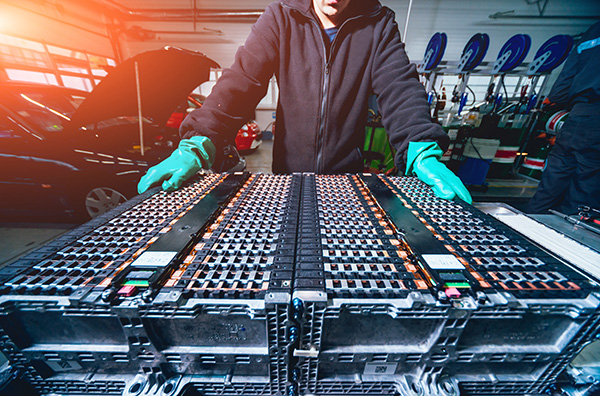
As hybrid vehicles become more popular, many drivers wonder how long their hybrid battery will really last. After all, the battery pack is one of the most important and expensive components in any hybrid system. While hybrid batteries are built to be durable, like all parts, they have a lifespan.
If you're driving a hybrid or considering purchasing one, it's helpful to understand how these batteries work, how long you can expect them to last, and what signs indicate that replacement may be on the horizon.
What Is a Hybrid Battery
A hybrid battery is not the same as the 12-volt battery that powers your lights, stereo, and starter. It’s a high-voltage battery pack that stores energy for the electric motor portion of the hybrid drivetrain. In most vehicles, this battery works alongside a gasoline engine to improve fuel economy and reduce emissions.
Hybrid batteries are designed to charge and discharge repeatedly, using regenerative braking to recover energy and deliver it when needed. Because they don’t rely on external charging (like plug-in electric vehicles), hybrids manage their own battery cycles internally.
Typical Lifespan of a Hybrid Battery
In general, hybrid batteries are designed to last between 8 to 10 years or approximately 100,000 to 150,000 miles. Many drivers find their batteries last even longer, particularly in mild climates and with proper maintenance.
Most automakers offer warranties for hybrid batteries that last at least 8 years or 100,000 miles, and in states that follow California emissions regulations, the warranty can extend up to 10 years or 150,000 miles. These warranties help protect owners against premature battery failure and reflect the manufacturer’s confidence in the battery’s durability.
That said, like all batteries, hybrid battery packs gradually lose their ability to hold a charge over time. Performance typically declines gradually, and issues often emerge long after the standard vehicle warranty has expired.
Factors That Affect Hybrid Battery Life
Driving conditions, climate, and how the car is used can all impact battery longevity. Extreme temperatures, both hot and cold, speed up battery wear, especially if the car is parked outdoors for long periods.
Frequent short trips, where the battery never gets a full charge-discharge cycle, may also shorten its life. On the other hand, highway driving and consistent use tend to be gentler on the battery pack.
Proper maintenance also plays a role. While hybrid batteries themselves don’t require routine service, the cooling system that regulates battery temperature does. A clogged or malfunctioning battery cooling fan can lead to overheating and early battery failure.
Signs Your Hybrid Battery May Be Failing
One of the most common early warning signs is a noticeable drop in fuel efficiency. As the battery loses capacity, the vehicle relies more on the gasoline engine, and your MPG may decrease.
You may also notice the engine running more often, even during low-speed driving or idling. Some hybrids use electric-only mode at low speeds, so if that function stops working, it could be a sign of battery trouble.
Other symptoms include sluggish acceleration, a “check hybrid system” warning light, or fluctuations in the battery level gauge on your dashboard. In more advanced stages of failure, the battery may no longer hold a charge and could cause drivability issues.
Replacement Options and Costs
If your hybrid battery fails, replacement doesn’t always mean buying a brand-new battery pack. Rebuilt or remanufactured batteries are often available at a lower cost and can extend the vehicle's life without a major investment.
New hybrid battery replacements vary in price depending on the vehicle model. While they used to be prohibitively expensive, costs have dropped significantly in recent years. Many shops now offer competitive pricing and warranties for replacement services, making battery replacement a more reasonable option for many hybrid owners.
In some cases, only individual battery cells need to be replaced rather than the entire pack, although this depends on the severity of the issue and the condition of the pack overall.
How to Maximize Battery Life
To get the most out of your hybrid battery, try to park in shaded or covered areas during hot weather. This helps reduce thermal stress on the battery. Keep your vehicle well-maintained, especially the cooling system and related components.
Drive regularly, and avoid letting your hybrid sit unused for long periods. If your car will be parked for weeks at a time, it may be helpful to start it occasionally and let it run to keep the battery from fully discharging.
Lastly, have your hybrid system checked by a technician if you notice any unusual behavior. Catching small issues early can prevent bigger repairs down the road.
Trust Central Automotive Service Center in Walnut Creek, CA
At Central Automotive Service Center in Walnut Creek, CA, we understand the ins and outs of hybrid systems. Whether you’re concerned about your battery’s health or simply want to ensure everything is working properly, our team can help.
We offer hybrid diagnostics, maintenance, and battery replacement options tailored to your vehicle’s needs. Schedule your visit today and keep your hybrid performing efficiently, mile after mile.